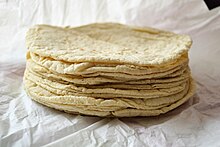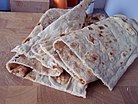Tortilla
 Corn tortillas | |
| Alternative names | Torta, tortita, Titiya |
|---|---|
| Type | Flatbread |
| Place of origin | Mesoamerica |
| Main ingredients | Masa harina, Hominy |
A tortilla (/tɔːrˈtiːə/, Spanish: [toɾˈtiʝa]) is a thin, circular unleavened flatbread from Mesoamerica originally made from maize hominy meal, and now also from wheat flour.
The Aztecs and other Nahuatl speakers called tortillas tlaxcalli ([t͡ɬaʃˈkalli]).[1] First made by the indigenous peoples of Mesoamerica before colonization, tortillas are a cornerstone of Mesoamerican cuisine. Corn tortillas in Mesoamerica are known from as early as 500 BCE.
Etymology
The word tortilla is derived from the Spanish word torta, meaning "cake," plus the diminutive -illa; as a result, the word means "little cake" in Spanish.[2][3]
Varieties

Corn
Tortillas made from nixtamalized maize meal—masa de maíz— are the oldest variety of tortilla. They originated in Mexico and Central America, and remain popular throughout the Americas. Peoples of the Oaxaca region in Mexico first made tortillas at the end of the Villa Stage (1500 to 500 BCE).[4][page needed] Towards the end of the 19th century, the first mechanical utensils for making tortillas, called tortilla presses, tortilleras, or tortilladoras, were invented and manufactured in Mexico.
Wheat
Europeans introduced wheat and its cultivation to the American continent, and it remains the source for wheat flour tortillas. Wheat flour tortillas originated in the northern region of Mexico.
Wheat tortillas usually contain fats such as oil or lard, salt, often leavening agents such as baking powder, and other ingredients. Otherwise, the preparation and cooking of flour tortillas on a comal is identical to that of corn tortillas. Flour tortillas are commonly used in dishes like burritos, tacos, and fajitas. It is part of the daily food repertoire throughout Mexico, whose gastronomy and culture has influenced those of many Central American countries and some states in the U.S.
Nopaltilla
A nopaltilla is a cactus-corn tortilla. The word is a portmanteau of nopal, Spanish for the Opuntia ficus-indica cactus, and tortilla.[5][6]
See also
- Lavash
- Arepa
- Chapati
- Indigenous peoples of the Americas
- Latin American cuisine
- List of tortilla-based dishes
- Sopaipilla
- Cornitos
References
- ^ Wood, Stephanie (ed.). "tlaxcalli". Online Nahuatl Dictionary. Wired Humanities Projects at the University of Oregon. Retrieved July 19, 2020.
- ^ "Tortilla Definition & Usage Examples". Dictionary.com. January 13, 2024. Retrieved January 13, 2024.
- ^ "Tortilla Definition & Meaning". Merriam-Webster. January 13, 2024. Retrieved January 13, 2024.
- ^ Winter, Marcus (1992). Oaxaca: the Archaeological Record (2nd ed.). Minutiae Mexicana. ISBN 968-7074-31-0. OCLC 26752490.
- ^ Bernal, Marisa (February 20, 2012). "Cactus tortillas offer a novel take on traditional food". Arizona Daily Star. Retrieved July 19, 2020.
- ^ Vercammen, Paul (March 17, 2009). "Can green tortillas create new jobs?". AC360°. CNN. Archived from the original on March 23, 2021. Retrieved July 19, 2020.

